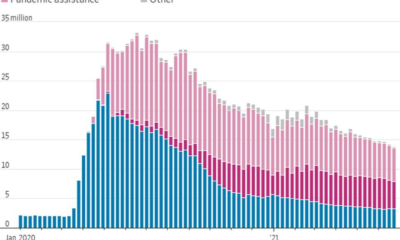Real Estate
30 Israelis make Forbes 2022 billionaires list, led by Miriam Adelson

Luke Tress is an editor and a reporter in New York for The Times of Israel.
Thirty Israelis were listed on the Forbes 2022 billionaires list released on Wednesday, including tech entrepreneurs, shipping magnates and a Hollywood producer embroiled in Benjamin Netanyahu’s corruption trial.
The highest-ranked Israeli was Miriam Adelson, listed as the 50th-richest person in the world with a net worth of $27.5 billion.
Adelson is from Israel, but Forbes placed her in the US in its annual ranking, since she holds American citizenship and lives in Las Vegas.
Adelson debuted on the list in 2021 after her husband, casino mogul Sheldon Adelson, died early in the year. He was a mega-donor to the Republican party and the publisher of Israel Hayom.
Miriam Adelson inherited most of her late husband’s fortune and became the wealthiest new billionaire in the world last year, placing 24th on the Forbest list. She lost around $360 million in the past year.
Eyal Ofer, the head of Ofer Global Holdings, was the wealthiest person in Israel on the list, in 117th place with a fortune of $15.4 billion derived from assets in the real estate and shipping industries.
His brother, Idan Ofer, is the next richest Israeli, in 188th place with $10.5 billion from shipping and energy interests.
The two are the sons of Israeli shipping tycoon Sammy Ofer, who was once Israel’s richest man.
Brothers Dmitri and Igor Bukhman, owners of the gaming company Playrix, were ranked 275th with $8.1 billion.
Arnon Milchan, an Israeli Hollywood film producer and a key witness in Netanayahu’s trial, was the 851st richest person with $3.5 billion.
Adam Neumann, the founder of WeWork, was ranked 2,076th with $1.4 billion. He resigned from WeWork in 2019 after the company’s disastrous IPO attempt, which was partly blamed on his management. That year, he had $4.1 billion.
Roman Abramovich, a Russian who holds Israeli citizenship and had been touted as the richest Israeli, was in 350th place with an estimated net worth of $6.9 billion, down from $14.5 billion last year. He was ranked among 83 Russians on the list.
Forbes said 34 Russians dropped off the billionaires list following the Russian invasion of Ukraine, the biggest drop of any country except China, which lost 87 billionaires due to a government tech crackdown.
Abramovich has been sanctioned by the European Union and the United Kingdom, but not the US.
The world’s richest person was Elon Musk, the founder of Tesla and SpaceX, with $219 billion, followed by Amazon’s Jeff Bezos, with $171 billion.
American tech giants Bill Gates, Larry Page, Sergey Brin, Larry Ellison and Steve Ballmer, as well as US investor Warren Buffet, were also in the top 10.
The Jewish former New York City mayor Michael Bloomberg was 12th, with $82 billion, and Facebook’s Mark Zuckerberg was 15th with $67 billion, down sharply from a year earlier.
Former US president Donald Trump was ranked 1,012 with $3 billion.
Josh Kushner, brother of Jared Kushner, became the first of his family on the list with a net worth of $2 billion from venture capital investments.
There were 2,668 billionaires in the world, 87 fewer than last year, worth a total of $12.7 trillion, Forbes said.
A total of 236 new billionaires were added to the list, including pop star Rihanna and director Peter Jackson, and 329 people fell off the list. The US had the most total entrants, with 735, followed by China, with 607.
The world’s billionaires overall lost $400 billion dollars in the past year.
France’s Francoise Bettencourt Meyers, heiress to the L’Oreal beauty company, was the world’s richest women, listed with her family at 14th place, alongside 327 other women on the list.
The richest self-made woman was China’s Fan Hongwei, who heads chemical supply company Hengli Petrochemical, who was in 88th place with with $18.2 billion.
Israel is now a far more prominent player on the world stage than its size suggests. As The Times of Israel’s Diplomatic Correspondent, I’m well aware that Israel’s security, strategy and national interests are always scrutinized and have serious implications.
It takes balance, determination, and knowledge to accurately convey Israel’s story, and I come to work every day aiming to do so fully.
Financial support from readers like you allows me to travel to witness both war (I just returned from reporting in Ukraine) and the signing of historic agreements. And it enables The Times of Israel to remain the place readers across the globe turn to for accurate news about Israel’s relationship with the world.
If it’s important to you that independent, fact-based coverage of Israel’s role in the world exists and thrives, I urge you to support our work. Will you join The Times of Israel Community today?
Thank you,
Lazar Berman, Diplomatic Correspondent
We’re really pleased that you’ve read X Times of Israel articles in the past month.
That’s why we started the Times of Israel ten years ago – to provide discerning readers like you with must-read coverage of Israel and the Jewish world.
So now we have a request. Unlike other news outlets, we haven’t put up a paywall. But as the journalism we do is costly, we invite readers for whom The Times of Israel has become important to help support our work by joining The Times of Israel Community.
For as little as $6 a month you can help support our quality journalism while enjoying The Times of Israel AD-FREE, as well as accessing exclusive content available only to Times of
Real Estate
Central banks end crisis-fighting measure as bank tumult recedes

Last month, the collapse of Silicon Valley Bank, the second-largest bank failure in US history, unleashed broader panic and raised fears the global financial system would seize up. Now, central banks are signaling that their immediate concerns have eased.
The Bank of England, the Bank of Japan, the European Central Bank and the Swiss National Bank said Tuesday that they would end daily measures to boost the flow of US dollars to lenders around the world. They cited “improvements in US dollar funding conditions” and “low demand” at recent operations aimed at providing liquidity.
Starting May 1, those operations will once again be held weekly, a decision made in consultation with the US Federal Reserve, the primary source of dollars. The frequency could increase again if needed, the four central banks said.
“These central banks stand ready to readjust the provision of US dollar liquidity as warranted by market conditions,” they said in their statements.
Policymakers sprung into action in March after the collapse of Silicon Valley Bank and Signature Bank in the United States sparked an acute bout of turmoil in the global banking sector. The tumult also nearly took down Credit Suisse (CS), a globally important but troubled bank, forcing Swiss authorities to arrange an emergency sale to rival UBS (UBS).
Hours after the Credit Suisse takeover was announced, the Fed said it would work with central banks in the United Kingdom, Japan, Canada, Switzerland and the European Union to make sure lenders there had access to the dollar liquidity they needed.
That meant making greater use of dollar swap lines, or agreements between the Fed and other central banks to provide dollars in exchange for, say, euros or yen.
Swap lines are a key instrument in central banks’ toolbox aimed at preserving financial stability and keeping credit flowing to households and businesses.
Real Estate
Fukushima’s fishing industry survived a nuclear disaster. 12 years on, it fears Tokyo’s next move may finish it off

It is still morning when Kinzaburo Shiga, 77, returns to Onahama port after catching a trawler full of fish off Japan’s eastern coast.
But the third-generation fisherman won’t head straight to market. First, he’ll test his catch for radiation.
It’s a ritual he’s repeated for more than a decade since a devastating earthquake and tsunami triggered a nuclear meltdown at the Fukushima Daiichi power plant in 2011, spewing deadly radioactive particles into the surrounding area.
Radiation from the damaged nuclear plant leaked into the sea, prompting authorities to suspend fishing operations off the coast of three prefectures that had previously provided Japan with half of its catch.
That ban lasted over a year, and even after it was lifted, Fukushima-based fishermen like Shiga were for years mostly limited to collecting samples for radioactivity tests on behalf of the state-owned electricity firm Tokyo Electric Power Company, or TEPCO, rather than taking their catches to market.
Ocean currents have since dispersed the contaminated water enough that radioactive cesium is nearly undetectable in fish from Fukushima prefecture. Japan lifted its last remaining restrictions on fish from the area in 2021, and most countries have eased import restrictions.
Shiga and others in the industry thought they’d put the nightmare of the past years behind them.
So when Japan followed through on plans to gradually release more than 1 million metric tons of filtered wastewater into the Pacific Ocean from the summer of 2023 – an action the government says is necessary to decommission the plant safely – the industry reeled.
The Japanese government and the International Atomic Energy Agency (IAEA), a United Nations body promoting the peaceful use of nuclear energy, say the controlled release, which is expected to take decades, will meet international safety regulations and not harm the environment, as the water will be treated to remove radioactive elements – with the exception of tritium – and diluted more than 100 times.
But with the deadline for the planned water release looming this summer, Fukushima’s fishermen fear that – whether the release is safe or not – the move will undermine consumer confidence in their catches and once again threaten the way of life they have fought so hard to recover.
Real Estate
Video shows US police at wrong house before shooting homeowner

Robert Dotson, 52, was killed by police on April 5 in New Mexico after officers responding to a domestic violence report arrived at the wrong house.
New Mexico police officers realised they were at the wrong address just moments before the front door opened and they fatally shot the armed homeowner, then exchanged gunfire with his wife, according to newly released body camera video of the April 5 shooting.
Robert Dotson, 52, was killed in Farmington, a city of 47,000 people in the southwestern US state, after officers on their way to a domestic violence call went to the wrong house.
The Farmington Police Department released several videos on Friday, including footage captured by body cameras worn by the three officers who fired their weapons.
“All of us – the men and women of the Farmington Police Department – recognise the severity of this incident,” Police Chief Steven Hebbe said in a statement.
“Once again, we wish to express our condolences to the Dotson family, and as your chief of police, I wish to convey how very sorry I am that this tragedy occurred,” Hebbe said.
-

 Business3 years ago
Business3 years agoHyundai Leads Industry in U.S. News & World Report 2023 Best Cars for the Money Awards
-

 Innovation3 years ago
Innovation3 years agoJay-S ventures into the urban genre with “Bailar en la Playa” his latest production
-

 Business3 years ago
Business3 years agoThree Questions Small Business Owners Should Ask In Creating A Workplace Culture – Forbes
-

 Business3 years ago
Business3 years agoA Fintech Makes It Easy For Small Businesses To Offer 401(k) Retirement Benefits – Forbes
-

 Business3 years ago
Business3 years agoBritain’s Small Businesses See Better Times Ahead But Is Their Optimism Justified? – Forbes
-

 Money3 years ago
Money3 years agoCharlie Crist leads Democratic gubernatorial field again in money chase – Florida Politics
-

 Money3 years ago
Money3 years agoTesting New Tools for Horizon Worlds Creators To Earn Money
-

 Business3 years ago
Business3 years agoSmall Business Labor Shortage – Forbes
